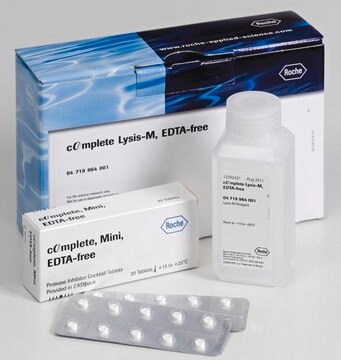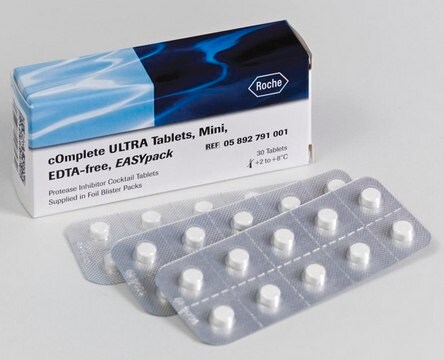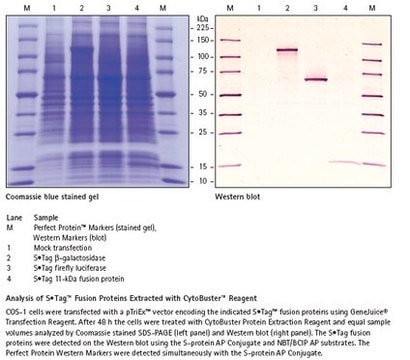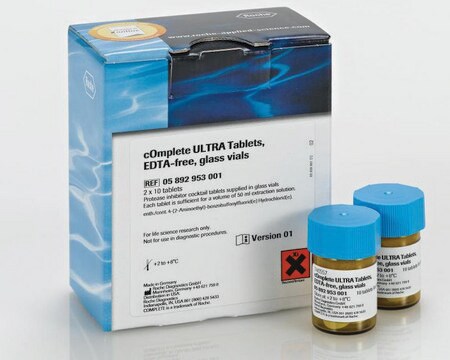04719956001
Roche
cOmplete™ Lysis-M
storage temp.:room temp
Sign Into View Organizational & Contract Pricing
All Photos(3)
About This Item
UNSPSC Code:
12352204
NACRES:
NA.21
Recommended Products
manufacturer/tradename
Roche
storage temp.
room temp
General description
The cOmplete™ Lysis-M mammalian cell protein extraction reagent contains a mild ready-to-use detergent (in 25mM bicine buffer, pH 7.6) that efficiently lyses mammalian cells and eliminates the need for scraping, sonication, or freeze-thaw cycles. It is required for the gentle extraction of proteins from both the cytoplasm and the nucleus of cultured mammalian cells. Protein yields obtained with this kit are 20 to 25% higher compared to three cycles of freeze-thaw, and approximately 20% higher than 2 minutes of sonication (with 50% pulse). Extracted proteins can be further purified or analyzed in downstream applications. Efficient lysis of mammalian cells occurs in only 5 minutes at room temperature.
The ready-to-use cOmplete™ Mini Protease Inhibitor Cocktail Tablets, included in the kit, function optimally with the kit′s Lysis-M reagent. The cOmplete™ Mini Protease Inhibitor Tablets allow the inhibition of a broad spectrum of serine, cysteine, and metalloproteases, as well as calpains. cOmplete™ Lysis-M reagent helps in protein extraction and simultaneously inhibit protease activity during the initial extraction steps. cOmplete™ Mini Protease Inhibitor Tablets contain both irreversible and reversible protease inhibitors.
The ready-to-use cOmplete™ Mini Protease Inhibitor Cocktail Tablets, included in the kit, function optimally with the kit′s Lysis-M reagent. The cOmplete™ Mini Protease Inhibitor Tablets allow the inhibition of a broad spectrum of serine, cysteine, and metalloproteases, as well as calpains. cOmplete™ Lysis-M reagent helps in protein extraction and simultaneously inhibit protease activity during the initial extraction steps. cOmplete™ Mini Protease Inhibitor Tablets contain both irreversible and reversible protease inhibitors.
Application
Lysis-M reagent is compatible with many different applications:
Note: cOmplete™ Mini tablets (included in the kit) contain EDTA (ethylenediaminetetraacetic acid). If the protein of interest is to be purified by IMAC (immobilized metal-chelate affinity chromatography), e.g., Poly-His tagged recombinant proteins, EDTA has to be removed (e.g., by dialysis) prior to the chromatography. Alternatively, the cOmplete™ Lysis-M EDTA-free product can be used.
- reporter assays (e.g., β-galactosidase, luciferase, chloramphenicol acetyltransferase)
- immunoassays (e.g., Western blots, ELISAs, RIAs)
- protein assays (e.g., protein kinase A, protein kinase C, and tyrosine kinase)
- protein purification
Note: cOmplete™ Mini tablets (included in the kit) contain EDTA (ethylenediaminetetraacetic acid). If the protein of interest is to be purified by IMAC (immobilized metal-chelate affinity chromatography), e.g., Poly-His tagged recombinant proteins, EDTA has to be removed (e.g., by dialysis) prior to the chromatography. Alternatively, the cOmplete™ Lysis-M EDTA-free product can be used.
Features and Benefits
- Preserves protein structure, since reagents will not denature or otherwise alter proteins.
- Saves money, since one product protects against many proteases.
- Saves steps, since extracted proteins may be used directly in many downstream procedures.
Packaging
1 kit containing 2 components. Each tablet is sufficient for 10 mL of extract. For the lysis of up to 100 g of mammalian cells.
Preparation Note
Intended use: Simultaneous extraction and protection of soluble proteins from mammalian cells.
Sample material: Mammalian cells in culture (e.g., Cos-7 cells, harvested at confluency).
Time required: 5 minutes (cell lysis at room temperature).
Number of extractions: 20 (10 ml each).
Effective against: Serine proteases, cysteine proteases, metalloproteases.
Note: Each cOmplete, Mini tablet is concentrated enough to inhibit proteases in 10 ml of extract.
Sample material: Mammalian cells in culture (e.g., Cos-7 cells, harvested at confluency).
Time required: 5 minutes (cell lysis at room temperature).
Number of extractions: 20 (10 ml each).
Effective against: Serine proteases, cysteine proteases, metalloproteases.
Note: Each cOmplete, Mini tablet is concentrated enough to inhibit proteases in 10 ml of extract.
Other Notes
For life science research only. Not for use in diagnostic procedures.
Legal Information
cOmplete is a trademark of Roche
Kit Components Only
Product No.
Description
- Lysis-M Reagent for protein extraction from mammalian cells
- cOmplete Mini Protease Inhibitor Cocktail Tablets supplied in EASYpacks
Signal Word
Warning
Hazard Statements
Precautionary Statements
Hazard Classifications
Eye Irrit. 2 - Skin Irrit. 2
Storage Class Code
12 - Non Combustible Liquids
WGK
WGK 2
Flash Point(F)
does not flash
Flash Point(C)
does not flash
Certificates of Analysis (COA)
Search for Certificates of Analysis (COA) by entering the products Lot/Batch Number. Lot and Batch Numbers can be found on a product’s label following the words ‘Lot’ or ‘Batch’.
Already Own This Product?
Find documentation for the products that you have recently purchased in the Document Library.
Customers Also Viewed
Bryan M Ham et al.
Journal of proteome research, 7(6), 2215-2221 (2008-04-17)
Ongoing optimization of proteomic methodologies seeks to improve both the coverage and confidence of protein identifications. The optimization of sample preparation, inclusion of technical replicates (repeated instrumental analysis of the same sample), and biological replicates (multiple individual samples) are crucial
Articles
cOmplete™ Lysis-M Protocol & Troubleshooting
Our team of scientists has experience in all areas of research including Life Science, Material Science, Chemical Synthesis, Chromatography, Analytical and many others.
Contact Technical Service














